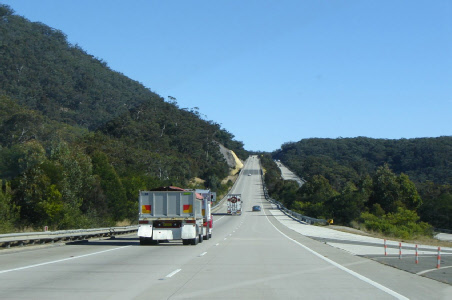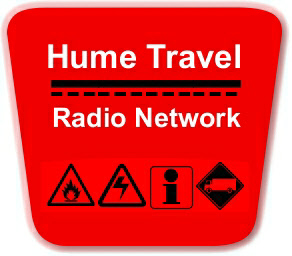
The Sound of The Hume Highway
Music
Tourist Info
Local News
Emergency Broadcast
•
•
•

What is "Local Radio"?
Local radio is not community radio. Local radio is not commercial radio. Local Radio combines the best parts of both in a format
that meets commercial advertising imperatives just as effectively as commercial radio whilst preserving the friendliness and
sincerity of community radio for listeners. This means Local Radio can be self-funding; it does not have to meet restrictions in
order to keep licenses or get government grants. It can sell straight advertising without the need to allude to advertisers as
sponsors.
In what ways it is different from community radio:
Local Radio is a commercial enterprise, all of the Stations are the result of private investment which means local radio
needs to be run at least with a view to making a profit. Whilst it can be a hobby or past time also; because it relies on a business
model to run business considerations must be kept firmly in mind. Local Radio relies on relative programming consistency. Too
often community radio stations suddenly program content that appeals to the presenter of the hour and 4 of their friends, this is
because of the open nature of community radio. This doesn't take into account that every time a presenter does this it alienates
large sections of the listening audience. This poses the question, is it the audience that is more important or the presenter - in
local radio it’s always the audience.
This doesn’t in any way restrict what programs are presented on local radio, only that their selection always has the largest
possible local audience predominantly in mind. Unlike community radio all programming is pre-planned as part of an overall
station image or sound agreed beforehand. Some community stations try to do this, but very quickly get complaints made
about them to the ACMA along the lines that they are not encouraging community participation when a tug of war occurs
between conflicting presenter tastes, usually across age groups.
Local Radio does not have to encourage community participation, it does, but there is no license requirement for it to do so.
Local Radio instead says “this is what we are doing come and work with us and contribute if you are interested in what we are
doing”. This doesn't mean that Local radio never changes format, like any business it responds to changing audience tastes. But
it does so in a careful, gradual and planned way, format changes are never ad hoc or sudden as building and retaining audience
relies upon long term consistency - often in community radio shows change monthly so other people can "get a go", of course
this is what community radio is for.
Local Radio is also managed by individuals rather than committees, therefore does not get bogged down in the trivial disputes or
power struggles that sadly often characterize community radio.
In what ways it is the same as Community Radio:
On Local Radio people can do shows in a reasonably control free environment (in fact people that have come from the community
radio sphere to us usually comment on how unrestrained it is working with us). We believe personality is a big thing on radio and
we want presenters to express themselves as individuals. We set very minimum standards on live programming (broad guidelines
on music strict guidelines on the the playing of adverts) and leave the rest to the presenter.
In what way it is different from commercial radio:
Commercial Radio does a lot of things right, it can get and keep advertisers and maintains (generally) a high standard of
professionalism with rigid quality controls. The only problem with this is that Commercial radio as a result sounds insincere, takes
no risks on content and tries hard to bombard the listener into a passive state of mind - This is why commercial radio is in decline.
Local radio relies upon local voices and local people who have a far less pushy style of presentation. The logic is that the same
information can be relayed in a format that is less controlled (or contrived as it sounds to the average commercial radio listener).
The preferred presenters on Local Radio are competent people who can hold a conversation but have ordinary untrained voices.
Local radio does not want to just sound like small scale commercial radio by employing people with years of radio experience.
This doesn’t necessarily mean Local Radio looks for ex-community Radio presenters either. Often community Radio presenters
develop a pretentious style which is pretty much as bad as the commercial one. Local Radio wants to sound “down to earth” to
the audience listening to it.
Indeed Local radio often gives voice to people whose voices are traditionally deemed unsuitable for both commercial and
community stations. It operates from the research that an audience will relate to the voice of someone they would hear in the street
in their locality, far better than a trained radio voice or a community radio presenter at a local university station.
In what ways it is the same as Commercial Radio:
It plays adverts on time every time. It plays them in a professional way and gives them the importance they deserve, without
them no income and no station!
In what way it is different from National Radio:
Many National Radio Stations call their programming “Local Radio”. However Local Radio is not just a snazzy branding; it is not
what is happening in Sydney, Melbourne, Adelaide etc. as they suggest - its what’s happening right here in your district or town.
It is Radio about your local area, not broad sweeping regions.
Local radio is not community radio. Local radio is not commercial radio. Local Radio combines the best parts of both in a format
that meets commercial advertising imperatives just as effectively as commercial radio whilst preserving the friendliness and
sincerity of community radio for listeners. This means Local Radio can be self-funding; it does not have to meet restrictions in
order to keep licenses or get government grants. It can sell straight advertising without the need to allude to advertisers as
sponsors.
In what ways it is different from community radio:
Local Radio is a commercial enterprise, all of the Stations are the result of private investment which means local radio
needs to be run at least with a view to making a profit. Whilst it can be a hobby or past time also; because it relies on a business
model to run business considerations must be kept firmly in mind. Local Radio relies on relative programming consistency. Too
often community radio stations suddenly program content that appeals to the presenter of the hour and 4 of their friends, this is
because of the open nature of community radio. This doesn't take into account that every time a presenter does this it alienates
large sections of the listening audience. This poses the question, is it the audience that is more important or the presenter - in
local radio it’s always the audience.
This doesn’t in any way restrict what programs are presented on local radio, only that their selection always has the largest
possible local audience predominantly in mind. Unlike community radio all programming is pre-planned as part of an overall
station image or sound agreed beforehand. Some community stations try to do this, but very quickly get complaints made
about them to the ACMA along the lines that they are not encouraging community participation when a tug of war occurs
between conflicting presenter tastes, usually across age groups.
Local Radio does not have to encourage community participation, it does, but there is no license requirement for it to do so.
Local Radio instead says “this is what we are doing come and work with us and contribute if you are interested in what we are
doing”. This doesn't mean that Local radio never changes format, like any business it responds to changing audience tastes. But
it does so in a careful, gradual and planned way, format changes are never ad hoc or sudden as building and retaining audience
relies upon long term consistency - often in community radio shows change monthly so other people can "get a go", of course
this is what community radio is for.
Local Radio is also managed by individuals rather than committees, therefore does not get bogged down in the trivial disputes or
power struggles that sadly often characterize community radio.
In what ways it is the same as Community Radio:
On Local Radio people can do shows in a reasonably control free environment (in fact people that have come from the community
radio sphere to us usually comment on how unrestrained it is working with us). We believe personality is a big thing on radio and
we want presenters to express themselves as individuals. We set very minimum standards on live programming (broad guidelines
on music strict guidelines on the the playing of adverts) and leave the rest to the presenter.
In what way it is different from commercial radio:
Commercial Radio does a lot of things right, it can get and keep advertisers and maintains (generally) a high standard of
professionalism with rigid quality controls. The only problem with this is that Commercial radio as a result sounds insincere, takes
no risks on content and tries hard to bombard the listener into a passive state of mind - This is why commercial radio is in decline.
Local radio relies upon local voices and local people who have a far less pushy style of presentation. The logic is that the same
information can be relayed in a format that is less controlled (or contrived as it sounds to the average commercial radio listener).
The preferred presenters on Local Radio are competent people who can hold a conversation but have ordinary untrained voices.
Local radio does not want to just sound like small scale commercial radio by employing people with years of radio experience.
This doesn’t necessarily mean Local Radio looks for ex-community Radio presenters either. Often community Radio presenters
develop a pretentious style which is pretty much as bad as the commercial one. Local Radio wants to sound “down to earth” to
the audience listening to it.
Indeed Local radio often gives voice to people whose voices are traditionally deemed unsuitable for both commercial and
community stations. It operates from the research that an audience will relate to the voice of someone they would hear in the street
in their locality, far better than a trained radio voice or a community radio presenter at a local university station.
In what ways it is the same as Commercial Radio:
It plays adverts on time every time. It plays them in a professional way and gives them the importance they deserve, without
them no income and no station!
In what way it is different from National Radio:
Many National Radio Stations call their programming “Local Radio”. However Local Radio is not just a snazzy branding; it is not
what is happening in Sydney, Melbourne, Adelaide etc. as they suggest - its what’s happening right here in your district or town.
It is Radio about your local area, not broad sweeping regions.

